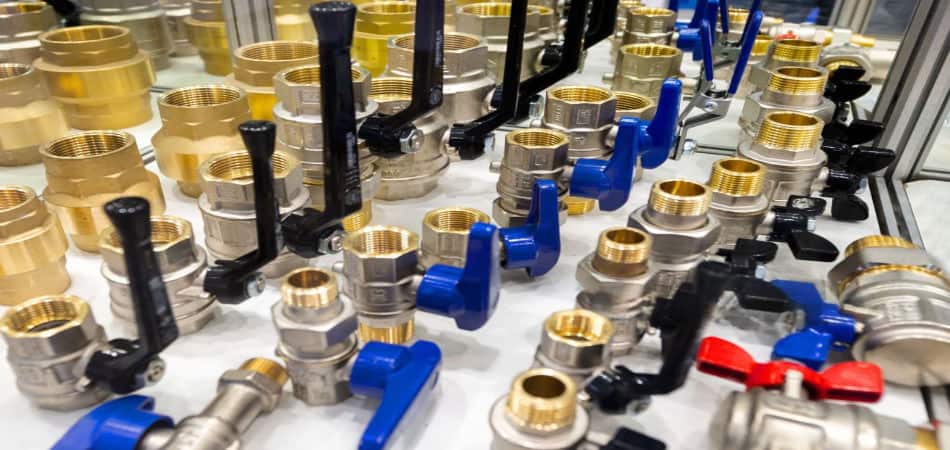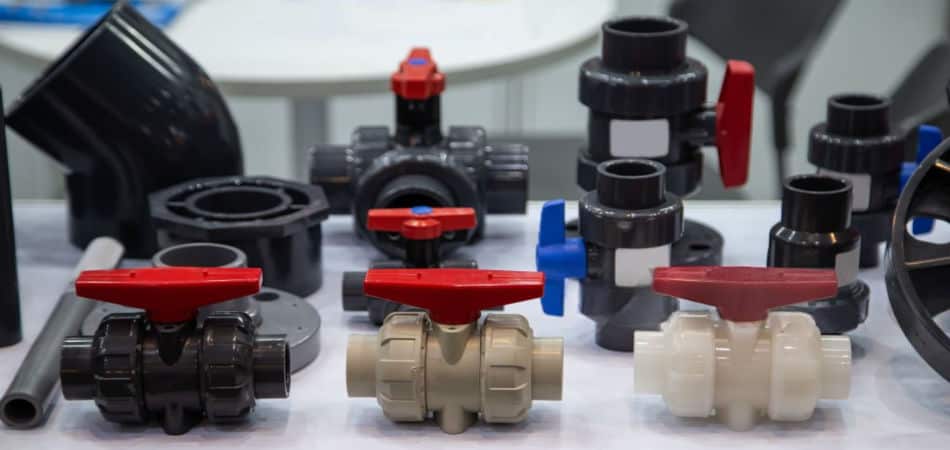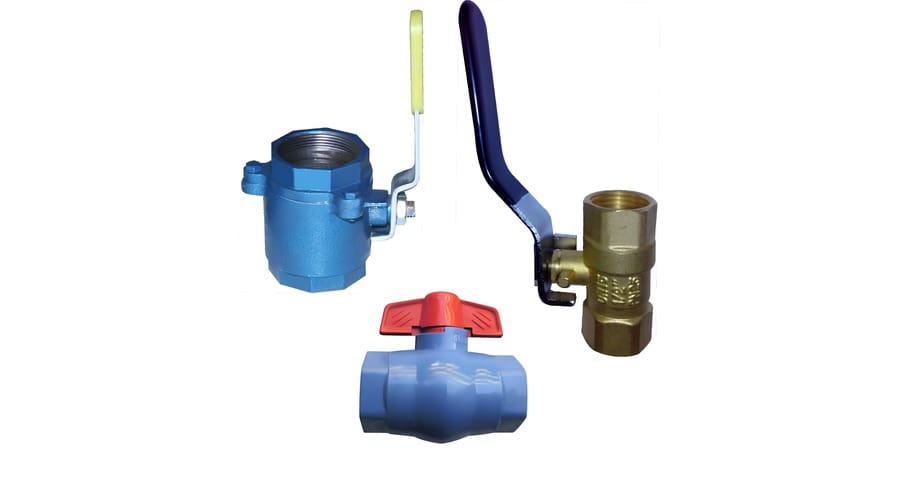Introduction
Ball valves are a key part of any plumbing system because they control fluid flow. Two ball valves are called brass ball valves, and PVC ball valves are commonly used. The choice of either can make a difference when you want to ensure efficient flow and longevity in several applications. This article will discuss the characteristics, benefits, and appropriate uses of brass and PVC ball valves so you can choose wisely according to your application needs.

Brass Ball Valve
Brass ball valves comprise a combination of copper and zinc, which have become very valuable due to their strength and durability. The valve consists of a spherical disc known as the ball, which controls fluid flow. The fluid can pass or block entirely by adjusting the handle by its rotation.
Characteristics and Advantages
- Durability: Brass is corrosion-proof; thus, brass ball valves can easily face the toughest conditions.
- High-Pressure Resistance: They resist very high pressure and are ideal for industrial use.
- Temperature Resistance: Brass ball valves work without damage within high and low-temperature applications.
- Versatility: These are widely used in various applications from plumbing to heating and even in gas lines

Application
Brass ball valves are commonly used in:
- Gas lines
- Hot water lines
- Home plumbing systems
- Industrial piping system
- Corrosion-prone environments such as outdoor installation occur
- In situations where long-term durability is required
PVC Ball Valves
The PVC ball valve is made of polyvinyl chloride. It is a form of plastic. The valves are designed to be similar to brass ball valves. It regulates the flow of liquid by using a spherical ball. However, PVC valves are lighter and often less expensive.

Characteristics and Advantages
- Cost Effective: It is cost-effective and perfect for projects that focus on cost-cutting.
- Light in weight: They are light in weight. Hence, they are easily installable and handleable.
- Corrosion Resistance: PVC is highly resistant to most chemicals and easily used anywhere corrosion is the problem.
- Low Thermal Conductivity: PVC is less temperature-sensitive. It can be used in cold water applications.
Application
PVC ball valves are commonly used in
- Aquarium
- Water lines
- Chemical Processing
- Budget-sensitive projects that require cost-effective execution
- Irrigation systems wherein the material is light in weight and resistant to corrosion
Brass ball valves Vs. PVC ball valve
1. Material Properties:
| Factors
|
Brass ball valve | PVC ball Valve |
| Resistance to Temperature | Brass ball valves can withstand hot temperatures and are best used in hot water.
The temperature range of Brass ball valves is from -20°C to 150°C (-4°F to 302°F). |
High temperatures liquid will lead to deformities.
Cold water, fluids at room temperature, and a few chemicals can easily pass through PVC ball valves.
0°C to 60°C (32°F to 140°F) is the temperature range for PVC ball valves.
|
| Pressure Ratings | In brass ball valves, the pressure rating is up to 600PSI for 1/4 to 2 inches, and it changes with size and type (some up to 1000 PSI).
It is best utilized for the high-pressure system like hot water, oil, and other industrial liquids.
|
PVC ball valves have a pressure rating of 150 PSI for 1/2 to 2 inches and 100 PSI for up to 12 inches.
It is suitable for systems of low to medium pressure and for chemical handling applications. |
| Freezing Conditions Resilience | Brass can withstand very low temperatures but can crack if water freezes inside it.
|
PVC valves become brittle in extreme cold conditions and occasionally crack under freezing conditions.
|

2. Ball Valve Types:
| Valve Type
|
Brass Ball Valve | PVC ball valve |
| Standard-Port Valve
|
Yes | Yes |
| Two-Piece Valve
|
Yes | Yes |
| Three-Piece Valve
|
Yes | Yes |
| Trunnion-Mounted Valve | Yes (Handle high pressure) | No |
| Floating Ball Valve
|
Yes | Yes (for low pressure) |
| Pneumatically Operated Valve
|
Yes | No |
| Electric Operated Valve
|
Yes | No |
| Socket-Weld Valve
|
No | Yes |
| Threaded Valve | Yes | Yes (more common in PVC) |
| Lever Operated Valve
|
Yes | Yes |
| Screw Valve
|
Yes (threaded) | Yes |
3. Chemical Compatibility and Connection Types:
| Factors
|
Brass ball valve | PVC ball Valve |
| Chemical Compatibility
|
Brass ball valves are suitable for all fluids like water, oil, and gas.
It is sensitive to acidic solutions that may shorten its lifetime.
|
PVC ball valves are very resistant to most chemicals and acids. |
| Connection Types | Brass ball valves are available with threaded (NPT and BSP) and soldered connections for a metal plumbing system. It is also used for heavy-duty applications.
|
PVC ball valves are coupled with socket and thread connections, suitable for plastic pipe systems, and can be glued or fitted with unions.
|

4. Performance and Durability:
| Factors
|
Brass ball valve | PVC ball Valve |
| Durability
|
Brass ball valves are more durable. They do not easily break even in harsh environments and heavy utilization.
|
PVC valves are brittle and will eventually degrade under UV light or extreme temperatures.
|
| Thermal Conductivity
|
Brass ball valves have high thermal conductivity. These valves become hot when high temperatures of fluid pass through them.
|
PVC ball valves have low thermal conductivity. These valves remain cool within their temperature range when the hot temperature passes through them.
|
| Impact on Flow Rate
|
Brass ball valves are available with full-bore options where the diameter of the opening at the ball fits with the inner diameter of the pipe.
It offers non-restrictive flow for large sizes and minimizes loss in pressure drop.
|
PVC ball valves are available in full-bore and smaller sizes with reduced-bore designs.
Reduced bores reduce the flow slightly according to the model and design.
|
5. Size and Colors Range:
| Factors
|
Brass ball valve | PVC ball Valve |
| Size Range | Common sizes of brass ball valves are available in 1/8 inch to 6 inches.
Sizes from 5 inches or above are customized on order and used in industrial applications in smaller pipes for high pressure.
|
Common sizes of PVC ball valves are available in 1/2 inch to 12 inches.
Sizes above 4 inches are used for irrigation and drainage in larger pipes for low pressure. |
| Color Availability
|
Brass ball valves are available in a natural metallic finish that allows less flexibility with visualization.
|
PVC ball valves are available in various colors, including white, grey, and blue, which makes it possible to easily color-codes for specific fluid
|
6. Regulatory Standards and Approvals:
| Factors
|
Brass ball valve | PVC ball Valve |
| Compliance | Generally covers all the
requirements of general standards set by the ANSI, ASME, and NSF, especially in potable water and industrial use. |
It may not be up to industrial standards regarding pressure and chemicals. These generally cover residential and low-pressure requirements. |
| Safety Ratings | Commonly certified used
for potable water, high-pressure, and industrial applications which provide further flexibility regarding legal acceptability. |
Generally rated for potable water systems but requires some specific type of certification. |

7. Maintenance and Installation:
| Factors
|
Brass ball valve | PVC ball Valve |
| Repair and Replacement Parts | Brass ball valve replacement is available with seals and handles, making it easy to repair and extend life.
|
The parts of the PVC ball valve are more limited, but sometimes, parts have to be replaced rather than repaired just because of how the valve is constructed.
|
| Cost Effectiveness
|
Brass ball valves are expensive but highly durable and performance-worthy.
|
PVC ball valves may be the cost-effective solution for applications requiring cost-cutting. |
| Weight and Installation
|
Brass ball valves are heavier than PVC.
Proper tools and expertise are required to install it.
|
PVC ball valves are very light.
Installation will be much easier as lightness will provide easy handling of the pipes. |
Conclusion
Brass ball valves vs. PVC ball valves: Which one is for you? It all depends on your application and requirements. Brass ball valves are great for harsh applications because of their high resistance to pressure and temperature resistance. PVC ball valves are good for those wanting a very inexpensive and light valve that can run at low pressures. Contact us if you want a reliable ball valve solution for your plumbing.
